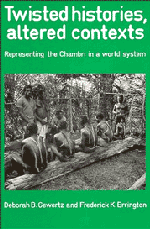Book contents
- Frontmatter
- Contents
- List of illustrations
- Acknowledgements
- Introduction: On writing the Chambri
- 1 The new traditionalism: tourism and its transformations
- 2 The initiation: making men in 1987
- 3 The town
- 4 Western representations at home
- 5 The written word
- 6 Negotiating with the state
- Conclusion: Interlocking stories, intersecting lives
- Appendix A: Godfried Kolly's life story
- Notes
- References
- Index
1 - The new traditionalism: tourism and its transformations
Published online by Cambridge University Press: 05 June 2012
- Frontmatter
- Contents
- List of illustrations
- Acknowledgements
- Introduction: On writing the Chambri
- 1 The new traditionalism: tourism and its transformations
- 2 The initiation: making men in 1987
- 3 The town
- 4 Western representations at home
- 5 The written word
- 6 Negotiating with the state
- Conclusion: Interlocking stories, intersecting lives
- Appendix A: Godfried Kolly's life story
- Notes
- References
- Index
Summary
Maliwan had been telling us of his plans for the forthcoming initiation of five of his eight sons, a ceremony we very much wanted to witness. The initiation, during which young men received hundreds of incisions on their arms, backs and sometimes on their buttocks and legs, was intended to transform them into productive adults. Although Deborah had seen two such initiations before – in 1974–75, during her first fieldwork among the Chambri – Frederick had never seen one. We wanted to know how maturity was defined and effected in 1987 and to what extent, if any, the ceremony would reflect the changes that the Chambri had been experiencing since the time of Deborah's first research among them.
Our first intimation of change in the initiation came when Maliwan said that we would each be charged an admission fee of K10, the amount decreed by custom, to enter the Walindimi men's house and attend the ceremony: this was the fee he was going to charge the tourists. “But,” we said in shocked surprise, “we have been living at Chambri a long time.” In response to our objection that we be grouped with the tourists for this occasion, he replied that any person not himself initiated who entered the men's house during the ceremony of initiation would either have to undergo initiation at that time or pay K10. Or, he added somewhat ominously, pay K20 or contribute a pig.
- Type
- Chapter
- Information
- Twisted Histories, Altered ContextsRepresenting the Chambri in the World System, pp. 25 - 57Publisher: Cambridge University PressPrint publication year: 1991



